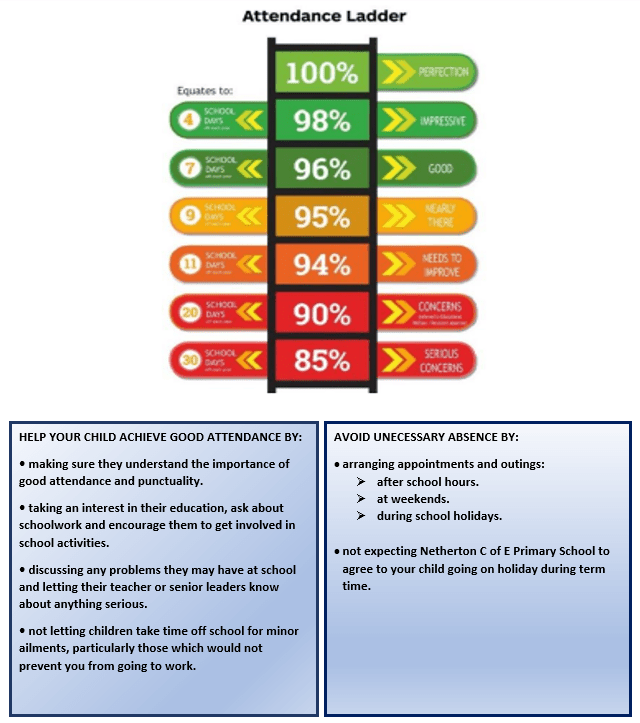Attendance
Netherton CofE has adopted the
5 Foundations of Effective Attendance Practice Framework,
this is modelled on the work of Professor Katherine Weare.
The emphasis is on developing a school culture and climate which builds a sense of connectedness and belonging to ensure all children can attend school and thrive.
The approach ensures we prioritise building solid working relationships with children & parents prior to any escalation.
The staged approach we use ensures we identify triggers early that can lead to poor attendance issues such as mental health issues, lack of trust, communication and relationship breakdowns and the possible lack of networking opportunities both internal (in-school) and external (external agencies).
Netherton C of E Attendance Policy
5 Foundations for Effective Attendance Practice
What is attendance and why is it important?
Going to school regularly is important for your child’s future. Put simply, if your child is not in school, they cannot learn.
Children need to attend school regularly to benefit from their education. Missing out on lessons leaves children at risk of falling behind. Children with poor attendance tend to achieve less in both primary and secondary school. DFE School Attendance May 2022
Who is responsible for attendance?
Parents – by law all children of compulsory school age must receive a suitable full-time education. For most parents, this means registering their child at school.
Once your child is registered at Netherton School, you, the parent, is legally responsible for making sure they attend on a regular basis.
School – Netherton school records details all children’s attendance and absence from school. We do so at the beginning of morning and afternoon sessions. If your child is absent, you must inform the school immediately.
The school will record the absence and the Local Authority will receive this information for each child. The Department for Education also receives annual attendance data for the school.
What is good attendance?
Your child should be in school every day and on time.
We understand that there are occasions when your child may not be able to attend school, if they are ill, for example. If your child cannot attend school, you should inform school immediately.
Is my child too ill for school?
Good attendance is not just about turning up each day, it is also important to be on time.
Being late, even by a few minutes, can add up to days of lost learning.
If you are running late, please inform school as soon as possible and bring your child into school as soon as you can – we would rather they came late than not at all.
Timings of the start of the school day
Procedure for reporting absence or lateness
Please phone Netherton C of E Primary School on 01384 816896 or you can report an absence via our website at Netherton C of E Primary School - Report an absence
We will need to know the name of your child, their class and the reason for their absence, as well as the name and relationship of the person reporting it.
If you do not report your child’s absence and we cannot get in touch with you, we may have to make a home visit.
Recognising and rewarding good school attendance
We want our pupils to form positive attendance habits in order for them to achieve in school and in preparation for their future in the workplace.
We reward good attendance but recognise that everyone is ill from time to time, which is why we reward all pupils individually.
For every day that they are present, pupils will achieve 1 Dojo, counting towards their rewards targets. This means they will reach those rewards more quickly.
5 days of attendance = 5 Dojos
Click here, for details of the Dojo targets & rewards
Pupils will also receive a 100% attendance sticker at the end of the week if they have been present every day that week.
In addition to this we will recognise good attendance 97%+ (rather than just 100%) each half term.
It is never too late to improve attendance and we want to work with our families and support them in order to do so.
We will also recognise and celebrate improvements in attendance.
Support with school attendance
Don't let attendance become a problem - we can help.
A child’s school attendance can be affected for various reasons. For example, if there are problems with:
- Friendship issues
- Difficulties with learning
- Anxiety
- Bullying
- Housing or care arrangements
- Transport to and from school
- Work and money
If your child starts missing school, you might not know there is a problem – our staff are trained to look out for changes in behaviour and/or attendance. They will talk to your child & you about any concerns, they will also report this to the attendance team.
If you know there is a problem, please speak to your child’s teacher, the school attendance team or a senior leader – we want to help resolve any issues and support you to ensure your child comes to school regularly.
Each case will be treated individually and therefore different strategies will be offered. Depending on the barrier(s) to attendance, school may be able to offer solutions such as adjustments to the start of the day to help your child settle, but in some cases families might be offered Early Help.
Some families are wary of this but please be assured this is about putting you in touch with agencies who can help and is done with your consent.
For more information about Early Help, click here.
Our approach to supporting and improving school attendance
Netherton CofE has adopted the 5 Foundations of Effective Attendance Practice framework. This is modelled on the work of Professor Katherine Weare.
The emphasis is on developing a school culture and climate which builds a sense of connectedness and belonging to ensure all children can attend school and thrive.
The approach ensures we prioritise building solid working relationships with children & parents prior to any escalation.
The staged approach we use ensures we identify triggers early that can lead to poor attendance issues such as mental health issues, lack of trust, communication and relationship breakdowns and the possible lack of networking opportunities both internal (in-school) and external (external agencies).
The Foundations framework has most recently been reviewed by the Department for Education. The Foundations framework received an excellent report following the four-day review.
“The Foundations approach is an excellent example of best practice; there are very clear and detailed systems and procedures in place to manage absence and attendance consistently”. (Michelle O’Dell DFE Attendance Advisor March 2022)
Our staged approach to supporting attendance
Netherton C of E wants to work with families to help remove barriers and help pupils to achieve and maintain good levels of attendance and punctuality.
We have created a staged approach to support good attendance. There are clear points when intervention or escalation will occur.
We will monitor pupil absence closely, recognising good attendance but also communicating with parents at set stages when their child’s absence starts to become a concern – the first stage being when their child’s attendance is in danger of falling below 97% (5 day’s absence), in order that we might work together to prevent this.
If your child’s absence reaches other stages of concern, there will be various interventions put in place, such as meetings with the attendance leaders (Mrs Rickers & Mrs Parton) where we will discuss a personalised plan of support to help you improve your child’s attendance – this may include involving external agencies to help – and setting targets.
Referral to ESS or social services would be a last resort, and only if there is no engagement at the previous stages of communication and support.


